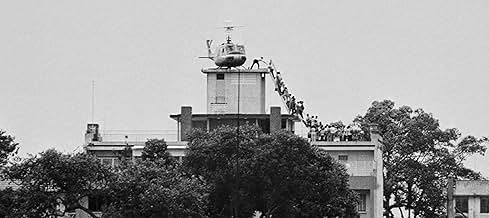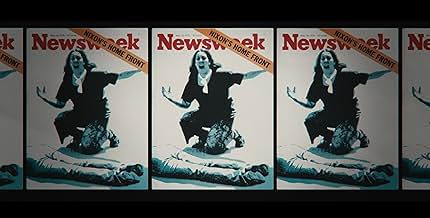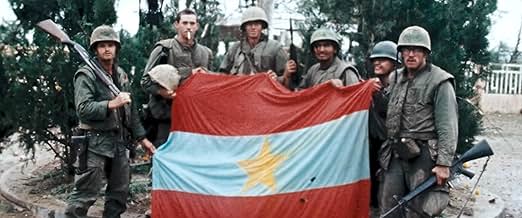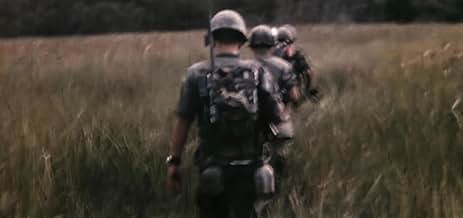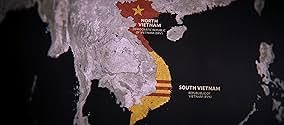Turning Point: La guerre du Vietnam
Titre original : Turning Point: The Vietnam War
- Mini-série télévisée
- 2025
- 1h 15min
Les effets profonds de la guerre du Vietnam sur l'identité américaine, provoquant des divisions sociales et érodant la confiance du gouvernement. Plus qu'une défaite militaire, elle a transf... Tout lireLes effets profonds de la guerre du Vietnam sur l'identité américaine, provoquant des divisions sociales et érodant la confiance du gouvernement. Plus qu'une défaite militaire, elle a transformé la politique et la culture des États-Unis.Les effets profonds de la guerre du Vietnam sur l'identité américaine, provoquant des divisions sociales et érodant la confiance du gouvernement. Plus qu'une défaite militaire, elle a transformé la politique et la culture des États-Unis.
Parcourir les épisodes
Avis à la une
I have been a Netflix subscriber for years and years and this has to be the best documentary I have ever seen. It is so thoughtful and through, and honest.
I remember sitting in the high school auditorium with all the other male seniors to sign up for the Selective Service in 1972. The representative where really honest with us. It was during the time when the draft was based on the lottery system. They told us if your number was 100 or less, you would be drafted, if it was about 100, no worries. Mine was in 343.
I had to possibility of participating in history, but too dimwitted to understand what it meant.
Now I know, and the knowing makes me feel ashamed for our country.
Best line in the documentary is "We are the United States of Amnesia". Ain't it so, all you can do is weep.
This is a must watch, even for people that do not live in this country.
I remember sitting in the high school auditorium with all the other male seniors to sign up for the Selective Service in 1972. The representative where really honest with us. It was during the time when the draft was based on the lottery system. They told us if your number was 100 or less, you would be drafted, if it was about 100, no worries. Mine was in 343.
I had to possibility of participating in history, but too dimwitted to understand what it meant.
Now I know, and the knowing makes me feel ashamed for our country.
Best line in the documentary is "We are the United States of Amnesia". Ain't it so, all you can do is weep.
This is a must watch, even for people that do not live in this country.
Therefore the first question will be: is it worth to watch?
To make it short: Yes, today more than some years ago It is of course primarily from an US point of view, in spite of several Vietnamese interview partners.
Does it miss possibly important details as some critics here argue? Most likely as all major conflicts have deeper roots and more sideways as you have footage to make a documentary about, but IMHO the series provides such a plethora of footage that most of us will see something new and disturbing.
The Vietnam War, as many conflicts before and afterward are presented as an array of conflicting political and military decisions, when in the end they are just killing humans on both sides for no reason. 50 years from now we'll see a similar documentary about the Ukraine, if free speech is still possible.
To make it short: Yes, today more than some years ago It is of course primarily from an US point of view, in spite of several Vietnamese interview partners.
Does it miss possibly important details as some critics here argue? Most likely as all major conflicts have deeper roots and more sideways as you have footage to make a documentary about, but IMHO the series provides such a plethora of footage that most of us will see something new and disturbing.
The Vietnam War, as many conflicts before and afterward are presented as an array of conflicting political and military decisions, when in the end they are just killing humans on both sides for no reason. 50 years from now we'll see a similar documentary about the Ukraine, if free speech is still possible.
Some comments are unfair to say that the series presented Ho Chi Minh as a leader who only wanted to turn Viet Nam communist. Very early on (I think latter part of Ep 1 or Ep 2 onwards), they narrated how Ho Chi Minh banked on the USA history's of struggle for independence against Great Britain, and hoped that the US would likewise support Viet Nam's fight against the French. It also recognized that in Viet Nam, the war was known as an "American War" instead of "Vietnam War", acknowledging the dominant US-centric perspective in calling it the latter.
For the most part, I found this documentary balanced, only because when I find myself sympathizing (?) with one side, it would give another perspective that makes you realize that none of those involved were innocent - they all have blood on their hands for having no regard for non-combatants/civilians. It's materials like this that give us a chilling reminder that war is never the answer.
For the most part, I found this documentary balanced, only because when I find myself sympathizing (?) with one side, it would give another perspective that makes you realize that none of those involved were innocent - they all have blood on their hands for having no regard for non-combatants/civilians. It's materials like this that give us a chilling reminder that war is never the answer.
As a British Army veteran with a longstanding interest in the Vietnam War, I approached Turning Point: Vietnam with the hope that it would offer a rich, balanced perspective on one of the most politically and morally complex conflicts of the 20th century. Unfortunately, what unfolds is a disappointingly narrow and overly Americanised narrative, filtered through a distinctly modern lens.
This series seems more interested in drawing parallels with today's ideological and cultural debates than offering a sober, historically accurate examination of the war itself. It applies 21st-century sensibilities to 20th-century geopolitics, and in doing so, misses the nuance, context, and texture that this subject demands. It felt less like a documentary and more like a vessel for contemporary messaging-at times bordering on revisionist history.
What's particularly jarring is the near-total absence of Vietnamese voices, both from the North and the South. The conflict, after all, was fought on their soil, among their people, and with devastating impact. The series gives little space to understanding the motivations of the North Vietnamese or Viet Cong beyond standard Cold War tropes, and barely touches on the tragedy of South Vietnam's fall. There's a living history here that is fading fast, yet the documentary doesn't seem interested in preserving or exploring it.
Likewise, Australia-America's most significant ally in the conflict outside of South Vietnam-is not mentioned at all. Over 60,000 Australians served in the war, with more than 500 killed. Their absence from this series further underscores the US-centric lens through which the entire conflict is portrayed. There's also scant reference to other contributing nations, such as South Korea, Thailand, or the Philippines, nor any deep analysis of the international ramifications of the war on post-colonial Asia.
The Vietnam War was never just a 'bad chapter' in American history, it was a global flashpoint, the culmination of colonial collapse, Cold War paranoia, and regional resistance movements. Any serious documentary on the subject should strive to examine not just what happened, but why, from all angles.
In the end, Turning Point, Vietnam feels like a missed opportunity. At a time when first-hand accounts are still possible, and when global perspectives are more accessible than ever, this series retreats into a familiar, overly simplified narrative. It does a disservice not only to viewers but also to the complexity-and humanity-of those who lived through the war on all sides.
This series seems more interested in drawing parallels with today's ideological and cultural debates than offering a sober, historically accurate examination of the war itself. It applies 21st-century sensibilities to 20th-century geopolitics, and in doing so, misses the nuance, context, and texture that this subject demands. It felt less like a documentary and more like a vessel for contemporary messaging-at times bordering on revisionist history.
What's particularly jarring is the near-total absence of Vietnamese voices, both from the North and the South. The conflict, after all, was fought on their soil, among their people, and with devastating impact. The series gives little space to understanding the motivations of the North Vietnamese or Viet Cong beyond standard Cold War tropes, and barely touches on the tragedy of South Vietnam's fall. There's a living history here that is fading fast, yet the documentary doesn't seem interested in preserving or exploring it.
Likewise, Australia-America's most significant ally in the conflict outside of South Vietnam-is not mentioned at all. Over 60,000 Australians served in the war, with more than 500 killed. Their absence from this series further underscores the US-centric lens through which the entire conflict is portrayed. There's also scant reference to other contributing nations, such as South Korea, Thailand, or the Philippines, nor any deep analysis of the international ramifications of the war on post-colonial Asia.
The Vietnam War was never just a 'bad chapter' in American history, it was a global flashpoint, the culmination of colonial collapse, Cold War paranoia, and regional resistance movements. Any serious documentary on the subject should strive to examine not just what happened, but why, from all angles.
In the end, Turning Point, Vietnam feels like a missed opportunity. At a time when first-hand accounts are still possible, and when global perspectives are more accessible than ever, this series retreats into a familiar, overly simplified narrative. It does a disservice not only to viewers but also to the complexity-and humanity-of those who lived through the war on all sides.
After Ken Burns' magisterial and monumental 18-hour deep dive into the Vietnam War, you'd think there'd be nothing left to say. But "Turning Point: The Vietnam War" on Netflix proves there's still room for new voices, especially from both North and South Vietnam, that bring fresh, essential perspectives to this complex and chaotic chapter of history. The series is balanced, detailed without dragging, and as harrowing as any account of America's decades-long misadventure. Fifty years after the fall of Saigon, this story remains urgent and deeply unsettling. Like Brian Knappenberger's earlier "Turning Point" series on 9/11 and the Cold War, it's clear-eyed, unflinching, and committed to telling the truth, warts and all. It's definitely a worthy watch.
Le saviez-vous
- AnecdotesAired on the 50th anniversary of the Fall of Saigon.
Meilleurs choix
Connectez-vous pour évaluer et suivre la liste de favoris afin de recevoir des recommandations personnalisées
Détails
- Date de sortie
- Pays d’origine
- Langue
- Aussi connu sous le nom de
- Turning Point: The Vietnam War
- Société de production
- Voir plus de crédits d'entreprise sur IMDbPro
- Durée
- 1h 15min(75 min)
- Couleur
Contribuer à cette page
Suggérer une modification ou ajouter du contenu manquant



